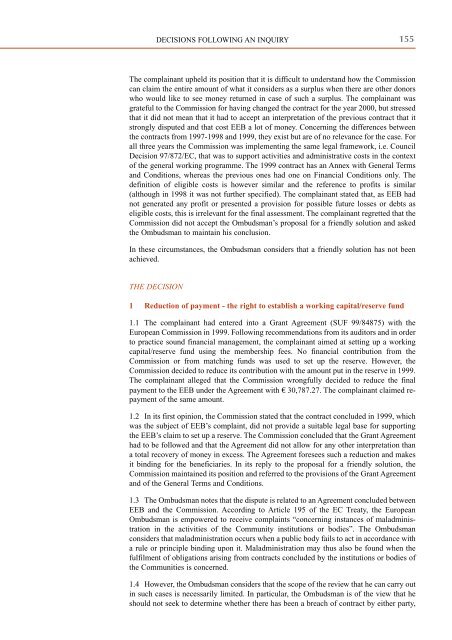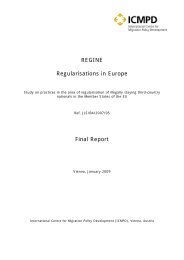Annual report 2002 - EOI
Annual report 2002 - EOI
Annual report 2002 - EOI
Create successful ePaper yourself
Turn your PDF publications into a flip-book with our unique Google optimized e-Paper software.
DECISIONS FOLLOWING AN INQUIRY 155<br />
The complainant upheld its position that it is difficult to understand how the Commission<br />
can claim the entire amount of what it considers as a surplus when there are other donors<br />
who would like to see money returned in case of such a surplus. The complainant was<br />
grateful to the Commission for having changed the contract for the year 2000, but stressed<br />
that it did not mean that it had to accept an interpretation of the previous contract that it<br />
strongly disputed and that cost EEB a lot of money. Concerning the differences between<br />
the contracts from 1997-1998 and 1999, they exist but are of no relevance for the case. For<br />
all three years the Commission was implementing the same legal framework, i.e. Council<br />
Decision 97/872/EC, that was to support activities and administrative costs in the context<br />
of the general working programme. The 1999 contract has an Annex with General Terms<br />
and Conditions, whereas the previous ones had one on Financial Conditions only. The<br />
definition of eligible costs is however similar and the reference to profits is similar<br />
(although in 1998 it was not further specified). The complainant stated that, as EEB had<br />
not generated any profit or presented a provision for possible future losses or debts as<br />
eligible costs, this is irrelevant for the final assessment. The complainant regretted that the<br />
Commission did not accept the Ombudsman’s proposal for a friendly solution and asked<br />
the Ombudsman to maintain his conclusion.<br />
In these circumstances, the Ombudsman considers that a friendly solution has not been<br />
achieved.<br />
THE DECISION<br />
1 Reduction of payment - the right to establish a working capital/reserve fund<br />
1.1 The complainant had entered into a Grant Agreement (SUF 99/84875) with the<br />
European Commission in 1999. Following recommendations from its auditors and in order<br />
to practice sound financial management, the complainant aimed at setting up a working<br />
capital/reserve fund using the membership fees. No financial contribution from the<br />
Commission or from matching funds was used to set up the reserve. However, the<br />
Commission decided to reduce its contribution with the amount put in the reserve in 1999.<br />
The complainant alleged that the Commission wrongfully decided to reduce the final<br />
payment to the EEB under the Agreement with € 30,787.27. The complainant claimed repayment<br />
of the same amount.<br />
1.2 In its first opinion, the Commission stated that the contract concluded in 1999, which<br />
was the subject of EEB’s complaint, did not provide a suitable legal base for supporting<br />
the EEB’s claim to set up a reserve. The Commission concluded that the Grant Agreement<br />
had to be followed and that the Agreement did not allow for any other interpretation than<br />
a total recovery of money in excess. The Agreement foresees such a reduction and makes<br />
it binding for the beneficiaries. In its reply to the proposal for a friendly solution, the<br />
Commission maintained its position and referred to the provisions of the Grant Agreement<br />
and of the General Terms and Conditions.<br />
1.3 The Ombudsman notes that the dispute is related to an Agreement concluded between<br />
EEB and the Commission. According to Article 195 of the EC Treaty, the European<br />
Ombudsman is empowered to receive complaints “concerning instances of maladministration<br />
in the activities of the Community institutions or bodies”. The Ombudsman<br />
considers that maladministration occurs when a public body fails to act in accordance with<br />
a rule or principle binding upon it. Maladministration may thus also be found when the<br />
fulfilment of obligations arising from contracts concluded by the institutions or bodies of<br />
the Communities is concerned.<br />
1.4 However, the Ombudsman considers that the scope of the review that he can carry out<br />
in such cases is necessarily limited. In particular, the Ombudsman is of the view that he<br />
should not seek to determine whether there has been a breach of contract by either party,
















